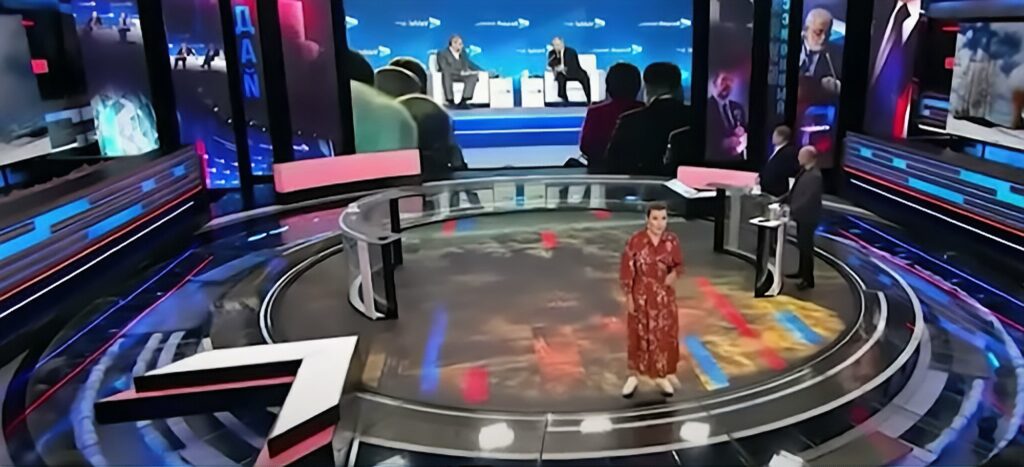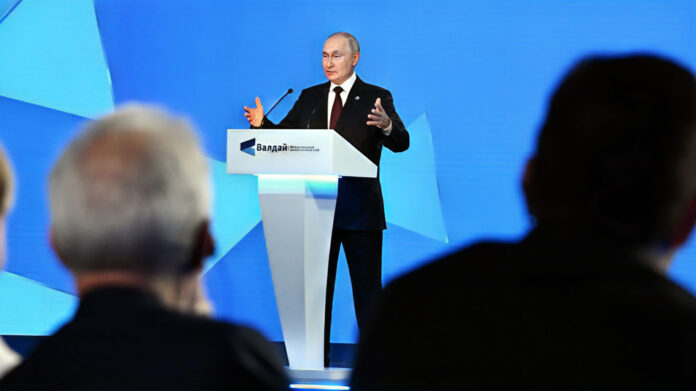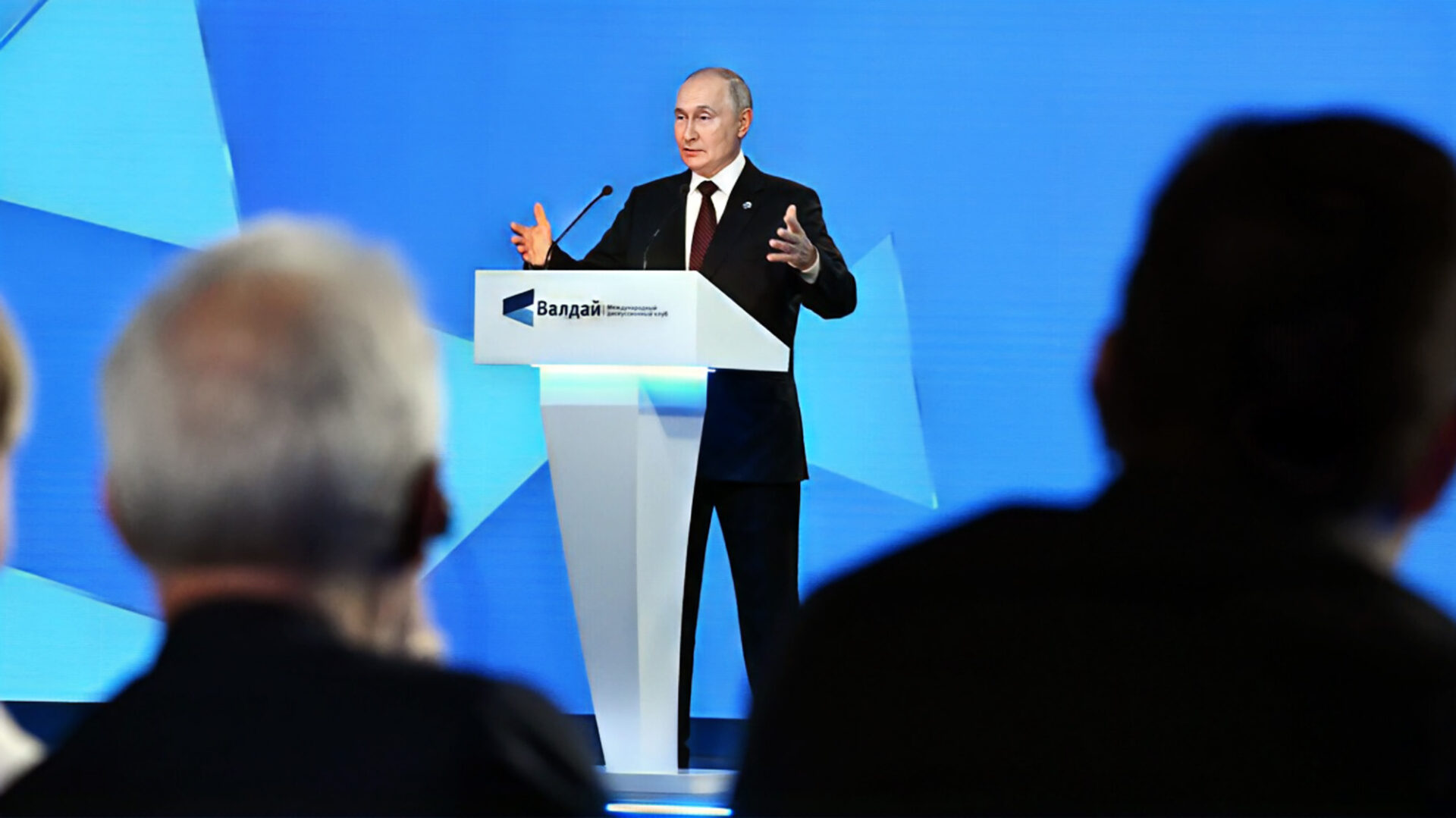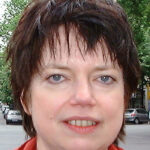On October 5, 2023, Vladimir Putin delivered a lengthy speech to the plenary session of the Valdai Discussion Club. Françoise Thom analyzes this speech, which unambiguously sets out the Kremlin’s global aspirations, and identifies its main ingredients. In particular, she highlights the intention to “destroy the international order and establish chaos in its place” in order to “engage in unrestrained depredations”. The support for Hamas shown by Putin and his propagandists is a perfect illustration.
The Valdai meetings are increasingly looking like the Komintern Congresses of the Stalinist era. Their aim is the same: to inform the leaders of pro-Russian parties abroad of developments in the Kremlin line; to convey Moscow’s propaganda directives to the vast network of agents of influence and Kremlinophile movements around the world.
Putin’s Valdai speech of October 5, 2023 can be equated with Andrei Zhdanov’s speech at the inaugural session of the Cominform on September 25, 1947, which marked the break with the Grand Alliance sealed in 1942 against Nazi Germany and its allies, and the official start of the Cold War. Putin’s speech merits a closer look, even if he said nothing fundamentally new, merely consolidating a doctrine that had been in the making for years. He did, however, strike us with his millenarian overtones. Referring to the Russian-Ukrainian war, Putin declares: “This is not a territorial conflict or even the establishment of a regional geopolitical balance. The issue is much broader and fundamental: we are talking about the principles on which the new world order will be based. […] Modern international law, built on the basis of the United Nations Charter, is outdated and must be destroyed, and something new must be created.” Like Zhdanov in 1947, Putin proclaims the existence of two irreconcilable antagonistic camps, and articulates his entire message around this confrontation.
The Valdai speech, and the exegesis of it by Kremlin propagandists, enable us to identify the various ingredients of Putin’s ideology, which grafts onto an omnipresent Soviet substratum more recent influences: that of the Mafia mentality, that of the KGB, and above all that of the Russian president’s particular obsessions.
The imprint of Marxism-Leninism
This substratum has increasingly cropped up over the years, even if Putin does not dream of abolishing private property. Whole swathes of Leninist ideology are recycled in his discourse. First, messianism: “We must take on the task of building a new world”, he insists. And, of course, Manichaeism. His entire Valdai speech is devoted to the antagonism between the two camps, “the West versus the Rest”, with the anti-Western camp led by Russia and Comrade Putin himself. The continuity with Zhdanov is obvious: “On the path of its aspirations to world domination, the USA collides with the USSR and its growing international influence, as the bastion of anti-imperialist and anti-fascist politics…”.
Determinism is also very important: according to Putin and his hacks, the old world order is condemned by history, just as the bourgeois camp was for Lenin and Stalin. Journalist Dmitry Popov writes: “Like many events we have witnessed, this will not happen because of the will of politicians, it may even be against their will, but because of the laws of historical development.”
Putin also shares the Marxist conception of wealth. He understands nothing about the production of wealth, and is unaware that it is created by human ingenuity, under the protection of the rule of law. He believes it results from the plundering of others: “The prosperity of the West has been largely achieved through the plundering of colonies over the centuries.” The West has reached “this level of development thanks to the plundering of the entire planet”. As we shall see, this posture enables him to remain steadfast in his denial of the contributions of Western civilization.
The “decolonial” theme also comes straight from Marxism-Leninism. To quote Zhdanov again: “The crisis of the colonial system, accentuated by the outcome of the Second World War, is manifested by the powerful rise of the national liberation movement in the colonies and dependent countries. By the same token, the backbone of the capitalist system is under threat.”
Finally, one of Putin’s rhetorical hobbyhorses — the defense of the “sovereignty” of peoples in the face of American “hegemonism” — has its roots in the Stalinist propaganda deployed from the end of 1947 to torpedo the implementation of the Marshall Plan. Zhdanov continues: “The imperialist countries, such as the United States, England and the states close to them, are becoming dangerous enemies of the peoples’ national independence and self-determination, while the Soviet Union and the countries with new democracies [the future People’s Democracies] provides a bulwark in the defense of equal rights and the national self-determination of peoples. […] The substance of the veiled, intentionally muddled formulas of the “Marshall Plan” consists in forming a bloc of states bound to the United States through commitments and offering European states American credits, in payment for renouncing their economic independence and, later, their political independence.”
Putin constantly accuses European leaders of betraying “national interests” and meekly following the orders of “their boss in Washington”: “Today, the AfD, Alternative for Germany, is raising its head. No wonder, because nobody in the ruling class fights for Germany’s interests. That much is obvious. […] As for Schröder, Germany can be proud of people like him. He is a true son of his people, he puts the interests of the German people first… What surprises me? I’ll tell you in all honesty: I’m surprised that such people and politicians [like Gerhard Schröder] still exist in Europe, that they have survived.”
The imprint of the Mafia mentality
To understand Putin’s hostility to the international order, we need to remember the milieu that enabled his ascent and fabulous enrichment. Putin made his career during the Yeltsin years, which he later decried so much, in the sheriffless Wild West that was Russia during this period, when everything could be bought and former thugs turned oligarchs offered themselves a mandate as a deputy to acquire immunity. He feels that, to succeed in the same way in the international arena, he must deconstruct it and create a jungle similar to the one in which the Russians of his generation lived, and which enabled his dizzying rise. His relentless fight against “American hegemony” is that of a gangster who sees an upright police officer pitted against him. His entire foreign policy program basically comes down to the quest for impunity. The “new, fairer world order” he celebrates is in fact a chaos in which the Russian president and his cohort of thugs hope to indulge in their depredations without restraint. “Sovereignty” as they understand it is the ability to do anything without getting a slap on the wrist.
As long as the old order lasts, Putin complains, “anyone can be attacked simply because this or that country is not liked by the hegemonic power […] Lasting peace will only be established when everyone begins to feel safe, to understand that their opinions are respected and that there is a balance in the world, when no one is able to force or coerce others to live and behave as the hegemonic power wishes. […] Anyone who behaves independently, who follows their own interests, is instantly turned in the eyes of Western elites into an obstacle that must be eliminated”. Putin takes exception to the idea that he should comply to rules: “What kind of ‘order’ based on certain ‘rules’? What are the ‘rules’ and who came up with them? It’s not at all clear. It’s pure nonsense… It’s always the same manifestation of colonial thinking. And as for those who advocate them, perhaps it’s time they got rid of their arrogance in the face of the international community that fully understands its tasks, its interests and it’s time they got rid of their mentality going back to the days of colonial domination. I’d like to say: open your eyes, those days are long gone and will never, ever return.” When the “new, fairer world order” is established, sanctions will be impossible: it will be “an open, interconnected world in which no one will ever attempt to erect artificial barriers to communication, creativity and individual prosperity. There should be a barrier-free environment — that’s what we have to strive for. […] Everyone should have access to the benefits of modern development, and attempts to limit it to a particular country or people should be considered an act of aggression, and nothing else.”
Putin’s contempt for the law goes so far as to call into question the very notion of the state, precisely because a state is based on a legal framework and has borders, something the Russian president does not like. Russia, Putin tells us, is a “civilization state”: “In the Russian Foreign Policy Concept adopted this year, our country is characterized as a distinct civilization state. This formulation accurately and succinctly reflects the way in which we understand not only our own development, but also the fundamental principles of the world order, whose victory we hope for.” In his view, “the main qualities of a civilization state are diversity and self-sufficiency”. “The world is moving toward a synergy of civilization states, of large spaces, of communities that recognize themselves as such.” This vision leaves no room for the nation state. Our sovereignists should understand that Putin’s conception of “sovereignty” is the antithesis of our own, which was formulated in the 16th century by magistrates. In Putin’s mind, “sovereignty” means impunity.
Putin dreams of deinstitutionalizing the “world order” just as he has deinstitutionalized Russia since 2000: “It is essential,” he tells us, “to free international relations from the bloc approach, from the legacy of the colonial era and the Cold War.” Agreements must be made on a one-to-one basis, as between mafia godfathers: “No one person decides for everyone, and not everyone decides everything, but those directly concerned with this or that issue agree on what to do and how to do it.”
The Chekist imprint
A tirade by the Russian president betrays his exasperation with democracies. Of course, their weakness is to be welcomed, but in Putin’s eyes they have the serious flaw of being unpredictable: “The paradox is that tomorrow the situation could change: that’s the problem. For example, there will be internal political changes after the next elections. One day, a country is pursuing this or that goal stubbornly, and the next day, domestic political changes occur, and they start to pursue sometimes completely different, even opposing goals, with the same determination and the same nerve. The most striking example is Iran’s nuclear program. A [US] administration pushed through one decision, another came along, everything was reversed and went in the opposite direction. How can you work in such conditions? Where are the points of reference? What can we rely on? Where are the guarantees? Are these the “rules” they’re talking about? What idiocy!” The former KGB agent’s frustration is understandable. How many admirably orchestrated operations have been derailed by electoral unpredictability! How many people carefully cultivated in the West by the Russian services have had their careers absurdly cut short by accusations of corruption!
The ideological war against the West
Putin understands nothing about Western civilization. On the other hand, he has an unerring instinct for what can destroy it. He relies on relativism, which in the West tends to be confused with objectivity: “There are many civilizations, and none of them is better or worse than the other,” he proclaims. His bête noire is universalism: he finds it intolerable that rules not imposed by him should apply to everyone. Putin is an outlaw in the literal sense of the word. “Civilization is not a universal concept, one for all — there is no such thing,” he insists. He holds a mortal grudge against Russians who leave the civilizational preserve of the “Russian world”, which he considers his property: “Of course, it’s forbidden to betray your civilization. It leads to general chaos, it’s unnatural and it’s repugnant, I would say.”
In 1947, after Zhdanov’s speech, Westerners realized that the confrontation with the Stalinist regime was also an ideological one. The Valdai speech should lead us to a similar realization. Putin’s destructive nihilism attacks the foundations of our civilization. The Russian president seeks to obliterate our heritage. From the 5th to the 4th centuries B.C., Greece and, later, Rome began to reflect about the universal, about nature and law, about the advantages and disadvantages of different political regimes, about the corruption of these regimes, about the role of justice in the survival of the City, about the necessary link between politics and morality, laying the foundations of Western civilization. It was precisely this intuition for the universal, present in the Ancients and in Western Christianity, that later enabled the development of science. Conversely, the relativism cultivated by Putin leads to a proliferation of superstitions and charlatanism, which are a threat to true knowledge. It condemns the people who profess it to an inability to put themselves in other people’s shoes, turning them into a herd of criminals unaware of their own moral decay. It deprives them of that sense of belonging to a common humanity that forms the basis of true civilization. Compare the plays of Aeschylus and Euripides, full of poignant empathy for the defeated Persians and Trojans, with the hyena-like howls of Russian propaganda and you’ll see that, once again, Putin is lying when he claims that no civilization “is better or worse than the other.”

The Hamas offensive and the emergence of the “new world order”
If you were wondering what the “new world order” that Putin celebrated in his Valdai speech might look like, all you have to do is look at the Kremlin’s propaganda reaction to the Hamas offensive, and everything becomes crystal clear. Military bloggers and the usual guests on the Solovyov and Co. talk shows literally revel in the “success of the Palestinian militants, who conquered more territory in 24 hours than the Ukrainian armed forces managed to cover in 4 months of ‘counter-offensive'”, and the “resounding slap in the face” inflicted on Israel and its intelligence services. Solovyov sets the tone, and this theme is sometimes repeated word for word every day, on every channel: “All the legends surrounding Israel have been destroyed. The Iron Dome? A fiasco. Tsahal? A fiasco. The Israeli services? A fiasco. Israeli tanks, the best in the world? A fiasco.”
Russia’s position must be clear, explains Andrey Gurulyov, a deputy who is full of admiration for the Hamas offensive: “Israel is the ally of the United States, Hamas and Iran are our allies. The President described our tasks and objectives perfectly in his speech at the Valdai forum”. Solovyov feels obliged to clarify: “I’m Jewish, but I’m not Israeli. I’m on the side of my homeland, Russia.”
Why these transports of ecstasy? There is an immediate cause, summed up inimitably by propagandist Sergey Mardan, who rubs his hands in glee because “the globalist toad will be diverted from Ukraine and will be busy trying to put out the eternal inferno in the Middle East.” Journalist Dmitry Popov oozes hatred for the Ukrainian president: “All the front pages, all the TV news are about Israel. And somewhere in the corner, Zelensky is writhing with withdrawal symptoms of his addiction to the limelight. […] The West’s priority when it comes to supplying arms and money is clearly Israel, not Ukraine, which will be dumped sooner or later anyway.” Blogger Sasha Kotz exults: “The West is infinitely more concerned about the fate of Israel than that of the capricious and indocile Ukraine, and assistance to Israel will be a good pretext for redirecting Western aid and efforts.” Did Putin anticipate this windfall when he said in his Valdai speech: “Around four to five billion dollars reach Ukraine every month through various channels — loans, subsidies of all kinds, etc. As soon as we stop that, it’ll all be over in a week. Everything. The same goes for the defense system: imagine that arms deliveries stop tomorrow — in a week the ammunition will be exhausted.”
The irreplaceable Sergey Markov points out another advantage for Russia of the Hamas offensive: the rise in oil prices resulting from this war. Sergey Markov also explains the main reason for the euphoria of the Kremlin and its ideologists: “The Hamas offensive is a fiasco of the unipolar world. Washington and Brussels are responsible for the death of Israelis and Palestinians. Since you’re not capable of running the world, get the hell out of Olympus!”
The helplessness of the West is plain to see: “Israel is tragically alone,” says Mardan. “And it’s not that decrepit old man, Biden, babbling his support, who can reassure the Israelis.”
Solovyov goes on: “You didn’t want to talk to Russia? Well, this is the result.” The new world order manifests itself in the punishment that inevitably befalls those who put their faith in the United States and the West instead of listening to Russia and siding with it: in 2008, Georgia lost two provinces; in 2014, Ukraine lost Crimea, and as the lesson wasn’t enough, in 2022 it lost its eastern provinces; in 2023, Armenia, which betrayed Russia, lost Karabakh; and Israel, which had wanted to strike a deal with Saudi Arabia without asking Moscow’s permission, was punished by the deaths of thousands of its citizens. TV presenter Olga Skabeeva can’t wait for the final act: “The United States is clearly not up to its role as the world’s hegemonic power. […] All that’s left is for Xi Jinping to set Taiwan ablaze, and then it will be all over, the world will change forever.”
No wonder official commentators are careful to stress that Putin has nothing to do with these developments, which, according to Dmitry Popov, are taking place “because of the laws of historical development”, with Putin merely describing these laws. The Kremlin’s leaders are so optimistic that Putin has even declared himself ready to accept Ukraine’s accession to the European Union, because he is convinced that the United States’ withdrawal will leave him master in Europe: “Let’s see how this situation develops. The Ukrainians want to join the EU — let them; the Europeans are prepared to accept them — let them…”
The picture of the world painted by Putin and his supporters is reminiscent of the distorting mirror created by the devil, which Andersen describes on the first page of The Snow Queen: “Everything good and beautiful that was reflected in it seemed to dwindle to almost nothing at all, while everything that was worthless and ugly became most conspicuous and even uglier than ever. In this mirror the loveliest landscapes looked like boiled spinach, and the very best people became hideous, or stood on their heads and had no stomachs. If a good, pious thought passed through anyone’s mind, it showed in the mirror as a carnal grin […] All those who went to the hobgoblin’s school -for he [the devil] had a school of his own- told everyone that a miracle had come to pass. Now, they asserted, for the very first time you could see how the world and its people really looked. They scurried about with the mirror until there was not a person alive nor a land on earth that had not been distorted”. One day, the mirror shattered into an infinite number of tiny splinters: “Some of the fragments were smaller than a grain of sand and these went flying throughout the wide world. Once they got in people’s eyes they would stay there. These bits of glass distorted everything the people saw, and made them see only the bad side of things, for every little bit of glass kept the same power that the whole mirror had possessed.” Seeing Putin and his propagandists gloating over the worst atrocities, and celebrating these horrors as the harbinger of a “fairer” new world, one gets the impression, that, like the tale’s young Kay, they are among those who have received a shard of the infernal mirror in their hearts.
She has a degree in classical literature and spent 4 years in the USSR from 1973 to 1978. She is an agrégée in Russian and teaches Soviet history and international relations at Paris Sorbonne.




